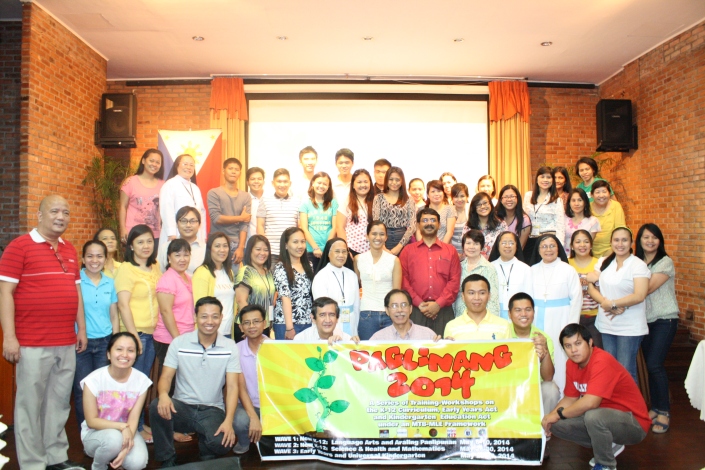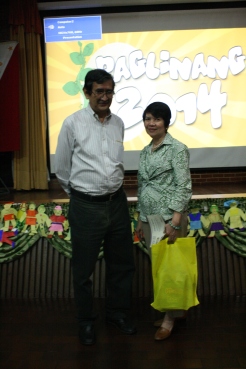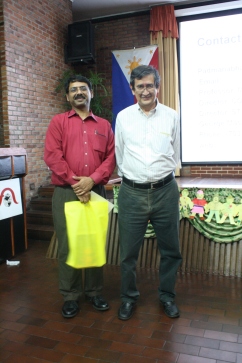Second Half of Paglinang 2014 Tackles Early Child Care, Science and Math
 Discussions and exercises in two separate tracks-yet plying the same route of child development-brought CFA’s Paglinang 2014 to a close. Paglinang was a series of training-workshops on the K-12 curriculum, Early Years Act and Kindergarten Education Act under a Mother Tongue Based-Multilingual Education (MTB-MLE) framework. The training-workshop held May 26-30, was attended by 55 teachers, education stakeholders, and students from 17 schools and universities.
Discussions and exercises in two separate tracks-yet plying the same route of child development-brought CFA’s Paglinang 2014 to a close. Paglinang was a series of training-workshops on the K-12 curriculum, Early Years Act and Kindergarten Education Act under a Mother Tongue Based-Multilingual Education (MTB-MLE) framework. The training-workshop held May 26-30, was attended by 55 teachers, education stakeholders, and students from 17 schools and universities.
Keynote speaker was Dr. Zenaida Domingo, Early Childhood Care Development (ECCD) consultant. She said, “Learning begins at birth and for this reason early childhood care and development should be made an essential part of the education system that is now regarded as a lifelong and lifewide enterprise.” Lectures on what MTB-MLE is and what it is not was given by Dr. Ricardo Ma. D. Nolasco, associate professor of the Department of Linguistics in UP Diliman, and convenor of Educational Resources on Multilingualism and Multiculturalism for All Teachers (ERMMAT).

Later in Day One and until early Day Four, the participants divided into two groups. One focused on Science and Mathematics; the second tackled Early Years and Universal Kindergarten. Among the speakers for Group 2 were, Dr. Rosario Alonzo, Dr. Estrella Agustin, Ms. Charla Rochella Santiago, and Asst. Prof. Maria Lourdes Quijano. They made presentations on Roadmaps to Literacy, Language and the Human Brain, Philosophy, Concepts and Methodologies in Early Years and Kindergarten Education Law, Early Literacy, Theories and Principles of Learning, L1-L2-L3 Teaching, Developmentally Appropriate Practices, Big Picture of MTB-MLE Planning, Integration of Different Subject Matter Areas, Translating, Materials Development, Transitioning to L2, English: Techniques and Strategies, Bridge to Written L2, and Planning the MTB-MLE Programs.
The Elementary Science School (ESS) Group from the University of the Philippines National Institute of Science and Mathematics Education (UP NISMED), Dr. Risa Reyes, Ms. Pia Campo, Ms. Sally Gutierez and Mr. Rolando Tan conducted the training-workshop on Science. They discussed and illustrated the Features of Science K to 12: Spiraling of Concepts, Modelling Activities on Sound and Modelling Activities on Solids.
The Math duo of Ms. Pauline Anne Therese Mangulabnan, professor of the De La Salle University Manila and Mr. Roberto Contreras talked about Trends in Learning Mathematics in the Early Grades, Concrete-Pictorial-Abstract Approach in Developing Learning Plans for Mathematics, Principles of Teaching Whole Numbers, Materials Development for Teaching Whole Numbers, Developing Mental Computational Skills Emphasizing on Conceptual Understanding, Problem Solving in the Early Years, and Aligning Materials of Problem Solving to Learning Competencies.

Dr. Padmanabhan “Padhu” Seshaiyer, Director of GMU Center for Outreach in Professional Mathematics Learning and Educational Technology (COMPLETE) spoke in the plenary on the afternoon of Day Five. He shared his teaching philosophy in mathematics, “Here is a problem, find the mathematics to solve it” rather than “Here is the mathematics, go solve the problem.”
The participants came from St. William Parish Nursery-Kindergarten – La Union, Immaculate Heart of College – Paranaque, St. Elizabeth Montessori – Baguio, St. Augustine’s School – Tagudin, Ilocos Sur, Hope Day Care Center, Kiddie Miracles Child Care Learning Center, Adamson University, San Nicolas Academy Kindergarten – La Union, La Concolacion – Laguna, Escuela de San Juan – La Union, St. Scholastica’s Academy – Marikina, St. Joseph Catholic School – Q.C, St. Paul College of Makati, St. John the Baptist Learning Center, Blessed Sacrament Catholic School, Sts. Peter and Paul Learning Center and De La Salle University Manila.